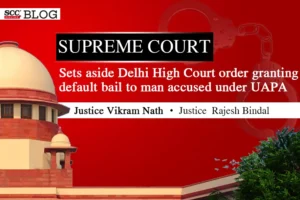Supreme Court: In an appeal filed by the State against the order passed by the Delhi High Court, wherein the Court has granted default bail to the accused under Section 167(2) of the Code of Criminal Procedure, 1973 (‘CrPC’), the division bench of Vikram Nath* and Rajesh Bindal, JJ. while setting aside the impugned order, said that the High Court has committed an error in allowing the petition and granting default bail to the accused.
Background:
A First Information Report was registered on 16-06-2020 against the accused for offences under Sections 13, 18 and 20 of the Unlawful Activities (Prevention) Act, 1967, Sections 201 and 120-B of the Penal Code, 1860 (‘IPC’), Sections 25, 54 and 59 of the Arms Act, 1959. Pursuant to the said FIR, the accused was arrested on 18-06-2020. He was first remanded to Police Custody for 3 days and then to Judicial Custody and has since been in jail. The period of 90 days expired on 15-09-2020. Before the expiry of the extended period of investigation which was valid until 11-11-2020, the Public Prosecutor moved another application requesting for further extension of time for investigation for a period of 30 days as per the provisions contained in Section 43D (2) (b) of UAPA. The said application was allowed by the Trial Court and the period of investigation was further extended till 30-11-2020. The investigation has since been completed and the Police report under Section 173(2) CrPC was submitted on 26-11-2020 before the extension period expires. The accused moved an application on 11-11-2020 under Section 167 of the CrPC for release on bail, which was rejected by the Trial Court. Aggrieved by the same, the accused preferred a petition under Section 482 CrPC for setting aside the orders extending the time of investigation, which was allowed by the impugned order, giving rise to the present appeal.
Analysis:
The Court viewed that the High Court has committed an error in allowing the petition and granting default bail to the accused.
After perusing Section 43 D(2)(b), the Court noted that the extension for investigation could be granted up to a maximum period of 180 days for the following reasons:
-
Completion of the investigation;
-
Progress in the investigation was explained; and
-
Specific reasons for detention beyond a period of 90 days.
After referring to State of Maharashtra v. Surendra Pundlik Gadling, (2019) 5 SCC 178, wherein the Forensic Science Laboratory ( ‘FSL’) report was awaited, and the detention of the accused was required as the financial details of the accused were still being ascertained in view of the huge conspiracy spreading over several cities were being investigated, the Court said that the High Court failed to take into consideration this judgment relating to UAPA and relied on Hitendra Vishnu Thakur v. State of Maharashtra, (1994) 4 SCC 602, a judgment of 1994 relating to provisions of TADA.
It further said that the High Court committed an error in recording a finding that sanction had already been received prior to the date of making the application for extension in November 2020. The recording of the said fact is not correct.
The Bench noted that the Public Prosecutor in the application had clearly mentioned that the sanction under Section 45(1) of UAPA had been obtained from Government of India, Ministry of Home Affairs and was attached with the case file. However, the sanction under Section 45(2) of UAPA was awaited from GNCT Delhi and that the sanction under Section 39 of the Arms Act was to be obtained after the results from the FSL were received.
Therefore, the Court viewed that the reason mentioned in the impugned order that the application had been filed for extension without any valid basis as the sanction had already been granted, was not correct.
The Court noted that the Public Prosecutor had mentioned in the request that major investigation of the case had been completed and the draft chargesheet had been prepared. However, for want of remaining sanctions and FSL report some more time was required for completing the investigation. It said that the High Court has erred in not taking into consideration that the reasons given under Section 43D(2) (b) were clearly made out and explained in the extension letter, giving the details of the progress of the investigation as also the reasons for detaining the accused
Further, the Bench said that the High Court failed to consider that after completing the investigation, the Police report under Section 173(2) CrPC had already been submitted prior to 30-11-2020 which was the last date of the extended period.
It also said that one more aspect to be considered is the nature of offence which involved terrorist activities having not only Pan India impact but also impact on other enemy States, should not have been taken so lightly.
Thus, the Bench set aside the impugned order and directed the authorities to take the accused into custody.
[State of NCT Delhi v Raj Kumar, 2024 SCC OnLine SC 6, decided on 03-01-2024]
*Judgment Authored by: Justice Vikram Nath
Know Thy Judge | Supreme Court of India: Justice Vikram Nath

